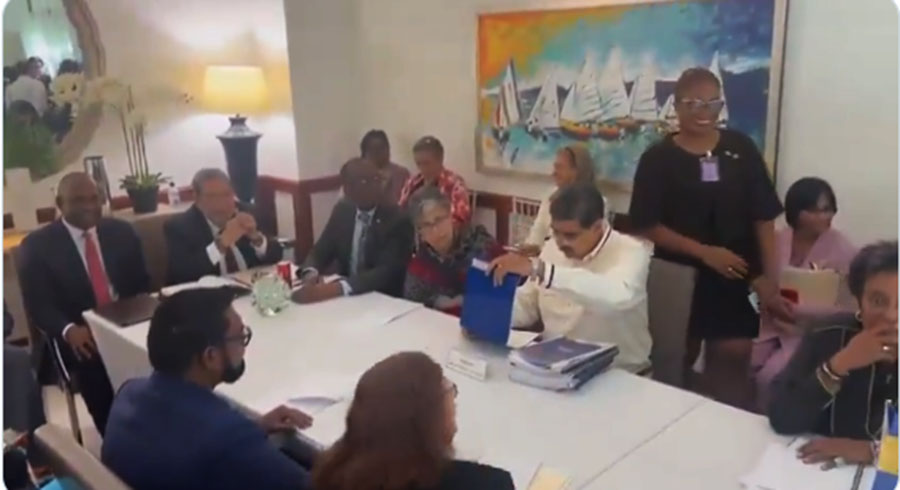Minister of Legal Affairs, Anil Nandlall SC said that negative reports here have given fuel to Venezuelan President Nicolas Maduro in his effort to put pressure on US oil company ExxonMobil.
The Attorney General told the Sunday Stabroek that at the meeting in St. Vincent and Grenadines on Thursday with President Irfaan Ali, Maduro had in his possession, several volumes of documents, containing information on the 2016 ExxonMobil Production Sharing Agreement (PSA) and the various reports by citizens claiming that ExxonMobil is robbing Guyana of its oil and gas resources.
“We noticed that Maduro had articles and reports on how Exxon is ripping Guyana off in light of the PSA and other loose statements that were reported in the public domain on how citizens were accusing the government of allowing Exxon to enter an agreement that would disenfranchise the country of its resources, it was that kind of fallacious and misleading information he had at the meeting”, Nandlall, who was at the meeting, stated.
He added that “Maduro also had critical commentaries on the operations of Esso Exploration and Production Guyana Limited (EEPGL) and the several legal proceedings filed in relation thereto – all extracted from the local media”.
“These are materials that Venezuela is using to bolster their narrative. Whatever weight is placed upon them, they certainly do not and will not assist Guyana in any form or fashion”, Nandlall posited.
The Attorney General said that some local media agencies have solely contributed to this high level of misinformation, which Maduro is now using as a tool to add fuel to the fire in light of the Guyana- Venezuela Border Controversy.
Both ExxonMobil and the Guyana Government have been excoriated by the media and civil society for allowing the 2016 PSA to continue in force unamended. Stabroek News has also called for the deal to be renegotiated.
According to Reuters, Maduro recently said that he would authorize oil exploration in an area around the Essequibo River, even though the territory is the subject of a controversy with Guyana.
This area has always been in control of Guyana and no Venezuela-backed explorer would likely come.
According to Maduro, Venezuelan state oil company PDVSA and state iron and steel maker CVG will create divisions for the Essequibo region.
The state companies will “immediately proceed to create the division PDVSA Essequibo and CVG Essequibo and immediately we’ll proceed to give operating licenses for the exploration and exploitation of oil, gas and mines in our Guayana Esequiba,” Maduro said on national television.
Maduro also said he has proposed a law to the government-controlled legislature to create the new state, and companies already operating in waters in the area would have three months to leave. The latter appeared to be a reference to ExxonMobil’s operations which are however not presently producing in that area.
Against this background, Nandlall said the Venezuelan President is using the negative reports about Exxon in Guyana to solidify his arguments that the oil company must exit Essequibo as it “clearly” has no good intentions for oil production. Exxon’s operations are currently off the Demerara coast.
The AG said while Maduro is using this opportunity to “build a case” against the US oil company amid these threats for it to cease all operations in Essequibo within the stipulated time frame, the Venezuelan Leader’s plans will never work.
“What he was saying at the meeting there are citizens who are not in favour of ExxonMobil due to their track record of exploiting other developing countries in the oil and gas sector, Maduro should not have any business with Exxon’s operations in the county of Essequibo because his plans will never work”.
“That is why I always say reporters must always be cognizant of what they put out especially in their news items because now Maduro is using everything that was reported as an arsenal to buffer his narrative and scheme in this situation, we need to be responsible as it relates to reporting because our enemies can use that against us”, the Minister of Legal Affairs said.
Guyana received bids for new shallow water and deep-water blocks from local and foreign companies in its first international bidding round in October.
The exploration licenses for those areas have not been signed but this has nevertheless triggered fierce opposition from Caracas.
Venezuela has grown increasingly hostile in a bid to force Guyana back to the negotiating table over Essequibo, a move Georgetown has ruled out as it is currently before the International Court of Justice on the substantive matter.
ExxonMobil says it will keep ramping up production in offshore Guyana despite the escalation of the territorial controversy with Venezuela.
In a brief statement posted Monday on Facebook, ExxonMobil Guyana Limited said it was reaffirming its “long-term commitment to Guyana”.
“We are not going anywhere – our focus remains on developing the resources efficiently and responsibly, per our agreement with the Guyanese government,” the company stated.
Guyana and Venezuela on Thursday agreed not to use force against each other in any circumstance, a key development for Georgetown in the light of months of tension over Caracas’ staging of a referendum on Essequibo and its subsequent decision to annexe the county which makes up five-eighths of this country.
The Meeting in St Vincent and the Grenadines, saw Presidents Ali and Maduro in a series of talks before final approval of an 11-point joint declaration which said that they both “Agreed that Guyana and Venezuela, directly or indirectly, will not threaten or use force against one another in any circumstances, including those consequential to any existing controversies between the two States”.
Nandlall via Facebook also said that Guyana came away from the Argyle engagement without ceding any of its positions but gaining much.
“We now have to wait and see whether the commitments made on paper will convert themselves into actions. In the regrettable event, they are not, their paper expression will only serve to solidify Guyana’s position for future engagements”, he stated.
“I observe some umbrage being taken to the terms ‘dispute’ as opposed to ‘controversy’ and ‘territory in dispute’. While historically, there was an insistence on the avoidance of the term ‘dispute’ about the issue at hand, the matter has since evolved”.
“It has been submitted by Guyana to the International Court of Justice (ICJ) for adjudication and the Court has assumed jurisdiction over the matter”.
“The jurisdiction of a Court of Law is activated only to resolve legal disputes, not controversies.
Indeed, there is a whole school of jurisprudential thought that compels a Court to decline jurisdiction if there is no real or bona fide dispute between the parties before it.
Not surprisingly, in its judgment granting the Provisional Measures, the Court itself used the terms “dispute” and “territory in dispute” seamlessly and interchangeably”, Nandlall said.
“Therefore, this objection is one overtaken by events and bears no merit”.
“In an earlier post, I cautioned against reckless speculative pontification on this matter. I hereby reiterate those admonitions. Similar loose public statements harmed us in our border matter with the Republic of Suriname. Those who are au fait with the facts of that matter would confirm this”, Nandlall said.





